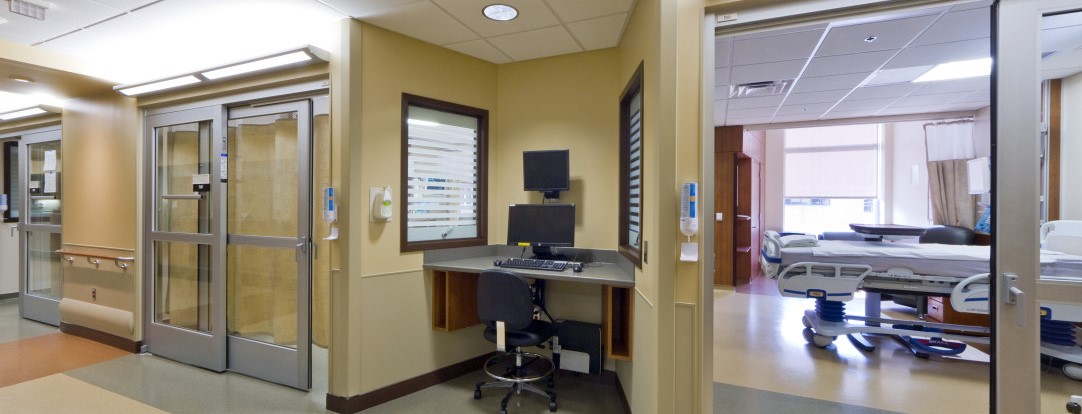
As soon as you are physically able, our therapists will begin working with you to see what type of help you will need in order to continue your healing process. An initial evaluation will be done and a plan will be made. Your therapist will explain everything to you and help encourage you. We know that your rehabilitation will not be easy and sometimes even painful. Our team of specialists are here to ensure that you get back to being independent as quickly as possible.
Physical Therapy
In the acute care setting, specifically with trauma patients, physical therapists initiate mobility with patients who have sustained some physical injury and/or have undergone a surgical procedure to address the same. Physical therapists evaluate and treat patients focusing specifically on tasks including bed mobility, transfer training and ambulation. Education is provided on compensatory training based on deficits present as well as implementation of assistive devices such as walkers, canes or wheelchairs. Physical therapists address range of motion, strength and balance deficits and provide education and exercise to progress patients toward their prior level of function pre-injury.
In the acute care setting, physical therapists will assist you with mobilility after your injury and/or a surgical procedure. These include:
- Bed mobility
- Transfer training
- Ambulating
- Bed mobility & transfers
- Education specific to your injury
- Learning how to use a cane, walker, or wheelchair properly
- Range of motion, strength and balance
- Providing education depending on your injury
The education and exercises provided by our physical therapists will help you progress toward your prior level of function before your accident.
In addition, one of the primary roles of physical therapists in the acute care setting is to determine if a patient is safe to return home upon discharge or if he or she will need additional therapy prior to. Our recommendations for individuals deemed safe to return home include home with no follow-up, home with assistance (i.e. from family or friends), home health therapy or out-patient therapy. If a patient is deemed unsafe to return and/or in need of additional therapy to return to their prior level we will recommend a patient discharge to in-patient rehabilitation or to a skilled nursing facility for further rehabilitation.
Occupational Therapy
The purpose of occupational therapy in any setting is to improve an individual's ability to participate in meaningful and purposeful activities that "occupy" one's time. This includes activities of daily living and self-care activities, work, play and leisure activities. "Occupation" includes things that people need to do, want to do, and are expected to do. Occupational therapy promotes health and well-being through occupation; it enables people to participate in activities of everyday life.
The primary role of occupational therapy in the acute care hospital setting is to initiate the rehabilitation process and to provide discharge recommendations regarding the next level of care should an individual require additional therapy or adaptive equipment should they return home. Disposition recommendations include home without follow-up therapy, home with assistance, home health therapy, outpatient therapy, inpatient rehabilitation, and rehabilitation in a skilled nursing facility setting. Equipment recommendations can include splints, self-care adaptive equipment (for feeding, dressing, grooming, bathing, toileting, etc.), and mobility equipment such as walkers and wheelchairs.
- Home without follow-up therapy
- Home with assistance
- Home health therapy
- Outpatient therapy
- Inpatient rehabilitation
- Rehabilitation in a skilled nursing facility setting
Equipment recommendations can include:
- Splints
- Self-care adaptive equipment (for feeding, dressing, grooming, bathing, toileting, etc.)
- Mobility equipment such as walkers and wheelchairs
Speech-Language Pathology
In the acute care setting, speech pathologists evaluate swallowing safety as well as cognitive and language skills in trauma patients. Depending on the severity of the TBI, repeat evaluations may be necessary to monitor the patient’s progress and update recommendations. Our team also makes recommendations for the next level of care, with special considerations for the patient’s safety and their rehabilitation needs, if any.
Speech-language pathology services will focus on the following areas:
- Assistive technology
- Attention
- Auditory comprehension
- Reasoning & Problem Solving
- Social Interaction Skills
- Spoken & written language skills
- Speech Production
- Swallowing
- Voice
- Memory
- Planning & Organizing
- Reading